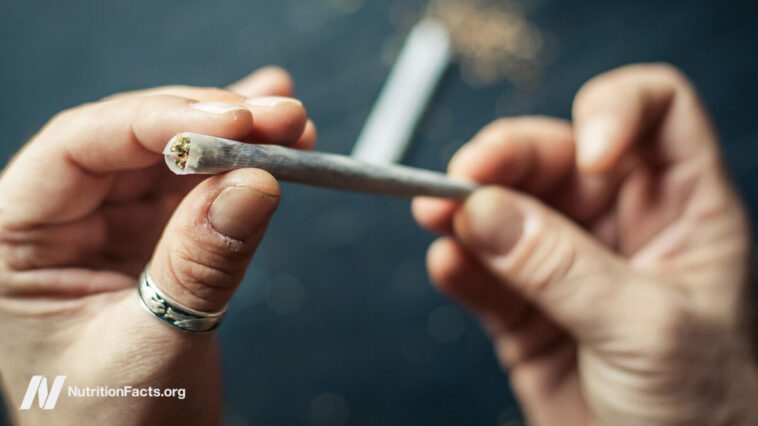Did traffic fatalities increase or decrease after cannabis legalization?
Is cannabis-impaired driving a public health and safety concern? Well, the number of tickets for cannabis-impaired driving went up in Washington State after legalization, as did the proportion of drivers in fatal car crashes in Colorado who tested positive for marijuana use. But, in both cases, this “may simply reflect a general increase in marijuana use” overall. It doesn’t mean that cannabis is causing the crashes, as I discuss in my video The Effects of Marijuana on Car Accidents.
There is a lot of evidence correlating marijuana use with car accidents, but who uses marijuana? Mostly young people and males. And guess who has a higher crash risk regardless of what they smoke? Young people and males. However, even taking that into account, it does seem that “roughly 20–30% of traffic crashes involving cannabis use occur because of the cannabis use.” But, to put that in perspective, that number is more like 85 percent when it comes to alcohol.
Aren’t cannabis crashes low-velocity fender-benders from an impaired driver going like five miles an hour? “After a systematic review of the literature,” a compilation of studies “examining acute cannabis consumption and motor vehicle collisions…found a near doubling of the risk of a driver being involved in a motor vehicle collision resulting in serious injury or death.” So, that’s pretty serious, but alcohol is even worse. Cannabis may double or triple the risk of car crashes, but alcohol may multiply the risk 6- to 15-fold. The combination may be even worse—25 times the odds of a fatal car crash involvement when testing positive for both cannabis and alcohol.
The “safety consequence of increased incidence of cannabis intoxication” when driving is listed as one of the “three primary reasons for concern about legalized cannabis….” Well, what happened in the U.S. states where marijuana was legalized? How much did traffic fatalities go up? They didn’t. In fact, they went down. What? “Why does legalizing medical marijuana reduce traffic fatalities?” Because of reduced alcohol consumption. It was found that “the legalization of medical marijuana is associated with reduced alcohol consumption, especially among young adults.” So, there was more drugged driving, but less drunk driving—and drunk driving is so much worse that fatalities went down overall.
So, perhaps we’d also see less liver disease and less alcohol-induced brain damage, as cannabis substitutes for some of the alcohol use. Indeed, researchers argued that “cannabis was unlikely to produce as much harm as alcohol because, unlike alcohol, cannabis did not cause liver and other gastrointestinal diseases, it was not fatal in overdoses, it did not appear to be as neurotoxic as alcohol, and it was not as potent a cause of car crashes as alcohol.”
“The health problems reported by cannabis dependent persons—e.g. bronchitis and impaired memory—are much less serious on average than those reported by persons who are alcohol dependent (e.g. delirium, liver disease, gastritis) but this does not mean that cannabis dependence is a minor problem.” When public health authorities bring that up, though, they may be criticized. In the 1940s and 1950s in the United States, for instance, after the repeal of Prohibition, we needed to warn people about the problems of heavy drinking, liver cirrhosis, and alcoholism, but some dismissed the concerns as if they were just “temperance propaganda.” We now see a similar situation, where the public health profession wants to educate people about the adverse health effects of cannabis but is dismissed as “reefer madness” hysterics.
Still, it’s important to put these adverse health effects in perspective. How does the safety of cannabis stack up against alcohol and tobacco? According to the Centers for Disease Control and Prevention (CDC), “alcohol is linked to approximately 88,000 deaths per year,” whereas “there are no reported deaths due to cannabis.” (They’re from things like car accidents.) What’s more, they even go down when more people smoke pot because alcohol is so much worse. “With hindsight, we can clearly see the enormous problems that have been caused to many individuals and to society by tobacco and alcohol”—both legal drugs. “If asked to decide today which psychoactive drugs should be legal, cannabis (which rarely kills people) might well be judged as being comparatively benign” and may be much higher on the list.
I have many other videos on cannabis if you’re interested. Check out the related posts below.
I first released these videos in a webinar, and you can find them all on a digital download here.








